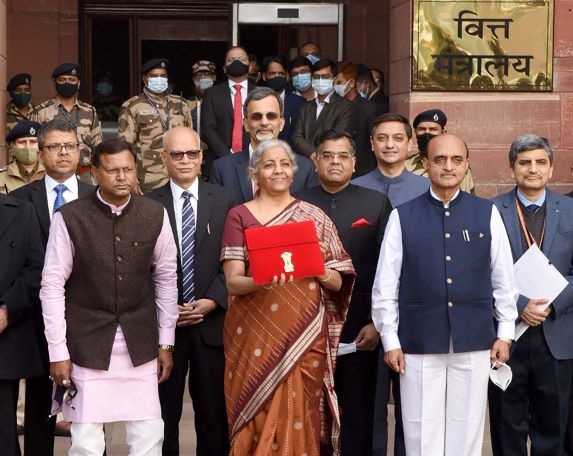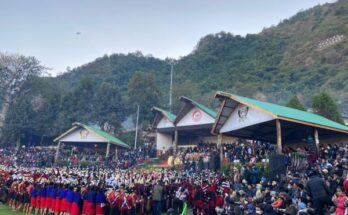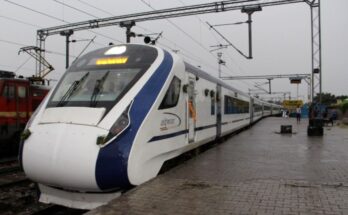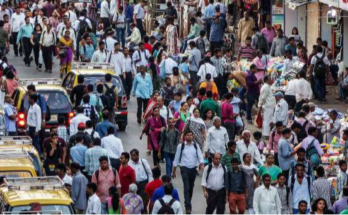Her Budget for the fiscal year beginning April 2022 is the Modi government’s 10th straight Budget since 2014

Team News Riveting
New Delhi, February 1
Finance Minister Nirmala Sitharaman presented the Union Budget on Tuesday, stating it was the blueprint for the next 25 years.
Ahead of the Budget presentation, Sensex jumped over 700 points. led by gains in IT and banking counters. On Monday, the Economic Survey 2021-22, tabled by Finance Minister Nirmala Sitharaman in Parliament, projected the economy to grow by 8-8.5% in the financial year beginning April 1 and said it was well placed to meet the future challenges on the back of widespread vaccine coverage, supply-side reforms and easing of regulations.
Her Budget for the fiscal year beginning April 2022 (FY2022-23) is the Modi government’s 10th straight Budget since 2014 (including one interim Budget presented ahead of general elections in 2019).
Finance Minister Nirmala Sitharaman on Tuesday again took a digital tablet wrapped in a traditional bahi-khata style pouch as she headed for Parliament to present the Union Budget 2022-23 in a paperless format just like the last year.
Key highlights of Budget speech so far:
* Finance Minister Nirmala Sitharaman on Tuesday proposed to introduce 400 new Vande Bharat trains and said contracts for multi-modal parks at four locations will be awarded next fiscal.
* She also said that a rationalised scheme to increase domestic oilseed production will be brought in to cut down imports.
* 100 PM Gati Shakti terminals would be set up in the next three years.
* Voluntary exit for corporates to be cut down to 6 months from 2 years
* Rs 2 trillion outay for MSMEs
* 2,000 km of rail network to be brought under indigenous technology KAWACH for safety and capacity augmentation
* To reduce indirect costs for suppliers, surety bonds will be acceptable
* Spectrum auction will be conducted to roll out 5G mobile services within 2022-23 by private firms
* 5 pc of USO Fund to be provided for R&D and technology upgrade
* Contracts for laying of optical fibre net to all villages under BharatNet to be provided under PPP mode
* Risks of climate change are strongest externalities for the world
* Low carbon development strategy opens up employment opportunity
* Tax deduction limit for state govt employees to NPS raised from 10% to 14%
* Fiscal deficit at 6.4% in FY23
* Four pilot projects for coal gasification and conversion of coal into chemicals
* States to be urged to revise syllabi of agricultural universities to meet needs of natural, zero-budget & organic farming, modern-day agriculture
* One class, one TV channel’ program of PM eVIDYA will be expanded from 12 to 200 TV channels
* This will enable all states to provide supplementary education in regional languages for classes 1 to 12
* In 2022-23, states will be allowed fiscal deficit of up to 4 pc of GSDP
* Rs 1 trillion financial assistance to states to be provided in 2022-23 to catalyse investments
* Proposed to introduce Digital Rupee by RBI using blockchain technology, starting 2022-23
* Measures will be taken to step up private capital in infra sector
* PE/VC invested Rs 5.5 trillion in start-up, expert committee will be set up to suggest measures to help attract investment
* Data centre and energy storage system to be given infrastructure status; move to provide easy financing
* International arbitration centre will be set up in GIFT city to provide faster dispute resolution
* World-class university to be allowed in GIFT IFSC free from domestic regulation
* Sovereign green bonds to be issued to mobilise resources as part of govt’s borrowing programme
* Public investment must take lead to pump prime private investment and support demand
* Financial support will be provided to farmers to take up agro-forestry
* Surcharge on Corporate tax pruned from 12% to 7%.
* Alternate minimum tax for cooperative societies down from 18.5% to 15%
* 200,000 Anganwadis to be upgraded for improving child health
* Natural farming will be promoted along Ganga river corridor
* Recognising the importance of ‘Nari Shakti’, 3 schemes were launched to provide integrated development for women and children



